Looking for ways to channel your energy into a creative force for good? Learn how others from Elon find fulfillment in giving back to their communities.
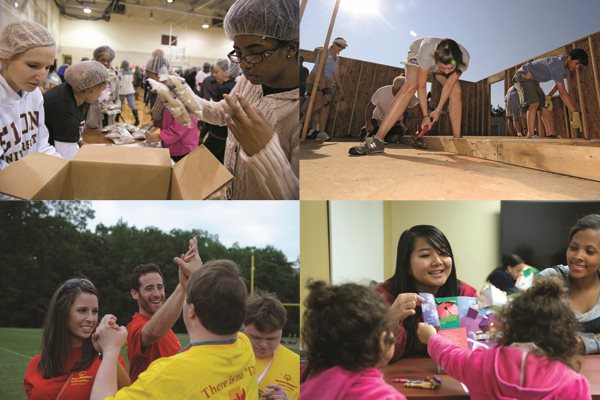
Introduction by the Rev. Richard McBride, Elon University chaplain emeritus
Service is in our DNA.
The Christian Sun, a newspaper of Elon’s founding denomination, proudly announced shortly before Elon first opened its doors that its graduates would be “shining lights in the church and blessings to society.” So they have been. From its earliest years, Elon has welcomed students who later distinguished themselves in the ministry, the classroom, the boardroom and the community, volunteering their time and talents to make the planet a better place.
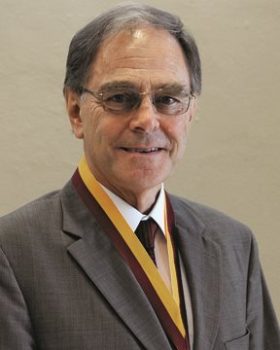 There’s no shortage of challenges in the world. Poverty. Illiteracy. Disease. Conflict. Seeking solutions requires creativity, compassion and, perhaps most importantly, knowledge grounded in critical thinking and global engagement. Sound familiar? These traits have been present in an Elon education for generations and can be found today in dozens of academic service-learning courses and volunteer activities through the Kernodle Center for Service Learning and Community Engagement, as well as other organizations on campus. Just this past fall, Elon President Leo M. Lambert declared 2014-15 a “year of service” with speakers and programs aimed at preparing students to make service a lifetime value.
There’s no shortage of challenges in the world. Poverty. Illiteracy. Disease. Conflict. Seeking solutions requires creativity, compassion and, perhaps most importantly, knowledge grounded in critical thinking and global engagement. Sound familiar? These traits have been present in an Elon education for generations and can be found today in dozens of academic service-learning courses and volunteer activities through the Kernodle Center for Service Learning and Community Engagement, as well as other organizations on campus. Just this past fall, Elon President Leo M. Lambert declared 2014-15 a “year of service” with speakers and programs aimed at preparing students to make service a lifetime value.
In his 1977 book Servant Leadership: A Journey into the Nature of Legitimate Power and Greatness, Robert Greenleaf offered one of the finest definitions of service that I know. Genuine service means “that other people’s highest priority needs are being served. The best test, and difficult to administer, is this: Do they, while being served, become healthier, wiser, freer, more autonomous, more likely themselves to become servants? And, what is the effect on the least privileged in society? Will they benefit or at least not be further deprived?” The best service we can provide, then, always relies upon a genuine partnership—a solidarity between helpers and those being helped.
At its core, service asks us all to reflect on the impact of what we do. Many of the essays you’ll read in the following pages reflect how different members of the Elon community have taken actions that get to the heart of Greenleaf’s wise observations. My hope for you is to find inspiration here, and to channel that energy into a creative force for good. It’s who we are. It’s in our DNA.
From college to service
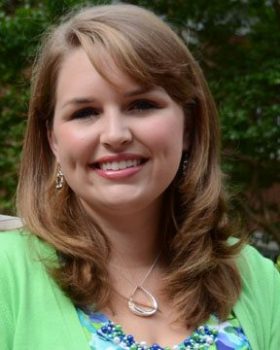 By Caitlin O’Donnell ’13, sixth-grade special Education teacher at Colleton County Middle School, Walterboro, S.C. (Teach For America Corps Member)
By Caitlin O’Donnell ’13, sixth-grade special Education teacher at Colleton County Middle School, Walterboro, S.C. (Teach For America Corps Member)
I can still remember the moment my post-grad plans started to deviate from the path I had so carefully envisioned. I was three weeks into a top-notch internship, hundreds of miles away from home, when it hit me like a pile of bricks: What my head had planned for so long no longer aligned with the direction my heart was leading me. And the place my heart led to was a destination I hadn’t considered in almost a decade.
For a career that was comfortable, suited my skill set and fell in line with everyone’s expectations, including my own, I was right on track. But for a career that complemented my values and pushed me beyond my comfort zone into an experience steeped in selflessness and the service of others, I needed to change course. Almost a year and a half since this “Big Decision Summer,” I am so thankful that I chose the latter and entered the classroom as a corps member with Teach for America. I am proud that my post-grad years have been defined by pushing others toward their goals and a brighter future.
For those considering a similar path of service, keep your values, not your desires, at the forefront of your mind. Think beyond additional lines on your résumé. As I began to consider a career in the classroom through TFA, I was consistently draw n to my favorite Bible verse, which comes from 1 Corinthians: “Let love be your highest goal.” For me, I felt I could best live out this personal mission at the helm of a classroom. While Teach for America is a two-year commitment, I am in the process of becoming fully certified and plan to remain in the classroom, in some capacity, for years to come.
What makes service after graduation special is that each person’s experience will be different and meaningful in its own way. No matter what degree you bring to your post-grad career, put your skills, knowledge and experience to good use. With degrees in journalism and history, it wasn’t initially clear to me how I’d utilize the expertise I spent four years developing. However, as I first began my career in the classroom, I intentionally took time to identify my strengths and target ways to incorporate them into my teaching. My experience organizing ideas through the inverted pyramid style of news writing allows me to write lesson plans that are focused, tight and well organized. My time as an editor of The Pendulum strengthened my ability to guide a large group of unique individuals toward a common goal.
Whatever your reason for considering a path of service and wherever your story takes you, find joy in the journey and travel along it with a purpose and for a purpose.
Service as a second career
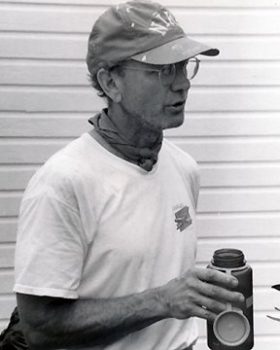 By Frank Lyon ’71, development officer for AmeriCares and Elon University Trustee
By Frank Lyon ’71, development officer for AmeriCares and Elon University Trustee
Over the past 42 years, I helped build BK International Insurance Brokers of Greenwich, Conn. It was rewarding work and our company eventually became an attractive acquisition for a large corporation. I could have stayed on in an executive role, but the company’s sale provided a perfect opportunity to begin a new chapter in my life. I retired on a Friday and couldn’t wait to start work the following Monday, devoting my full energy to support AmeriCares’ humanitarian mission. The past year has been spectacular, and my new job is no surprise to my family and friends.
I developed a passion for service as an Elon student and made sure I carved out time in my career to be an active volunteer. The opportunities came through the mission program of New Canaan Congregational Church. We build houses in impoverished areas of Appalachia, the Caribbean, Africa and hurricane-damaged areas of the Gulf Coast. When our group wraps up work on a project, I usually don’t want to leave and head home feeling guilty that I feel so good—it’s invigorating to help people who are facing tremendous challenges.
The church work has been amazing, but I hungered for even more. So I was among the first volunteers for AmeriCares when it was founded in New Canaan in 1982. This nonprofit disaster relief organization has provided more than $11 billion in medical and humanitarian aid to people in 164 countries. I’ve been involved in earthquake relief in Turkey, India and Central America, and we are currently supporting the fight against Ebola in West Africa. I truly feel like I am the luckiest man in the world to have the opportunity to make a difference in people’s lives.
As I complete my first year as an AmeriCares staff member, I’ve reflected on the role of service in my life. I’m a Type A personality and not the kind of guy who is satisfied to simply mail in a check to support a worthy cause. Pounding nails, getting dirty and dead-tired, and living in primitive conditions keeps me level and grounded, and helps me understand what life is all about. I’ve met amazing people around the world and been humbled at the depth of the human spirit in the worst situations.
These days I combine my service in disaster zones with the important work of raising money for AmeriCares. Most days I put on a suit to meet with donors. But I’m always anxious for the next chance to grab a hammer and rebuild a house. At age 66, the furthest thing from my mind is relaxing on a beach and reading a book. I have the spirit of a 20-year-old and I want to stay at this work for as long as I can.
Finding your way in college through service
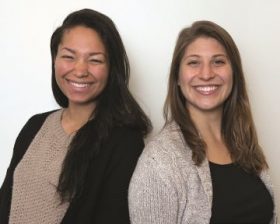 By Rachel Lewis ’15 and Maria Restuccio ’15, interns with The Kernodle Center
By Rachel Lewis ’15 and Maria Restuccio ’15, interns with The Kernodle Center
Like other college students, we arrived at Elon more than three years ago with identities and perspectives shaped by our lives at home. We soon met new people and tried new things, but most important of all, we challenged ourselves to step out of our comfort zones and explore a new community. How? Service.
Service expanded our academic studies as we engaged with our new community. It strengthened our worldview, a critical first step in helping us find our identities as young adults. Going into a community different from the one in which you were raised helps you recognize differences in perspective, encouraging you to see that your idea of “normal” isn’t necessarily normal at all. Working at a soup kitchen or emergency shelter, for example, can teach volunteers that not everyone makes enough money to survive in our society. Likewise, weekends with Special Olympics athletes can show that not every individual has the same abilities—and that service is often about relationship building.Regardless of where you live, there are ways to make volunteering a lifelong habit. Here are four ideas for getting involved, staying involved and growing the relationships that you develop through service:
- Bring a friend. Going with a friend can help you reflect openly and honestly about this shared experience.
- Let service supplement your lifelong learning. Words like “power” and “privilege” can seem abstract until you see them in action in your community.
- Uncover hidden passions via service. Your service doesn’t have to directly align with your studies or career goals.
- Recognize your skills and use them to serve a community organization.
We know we didn’t “change the world.” However, our education and volunteer experiences sparked conversations about social justice and citizenship that helped us understand the privilege of a college education and our responsibility to use that education to make our communities even stronger. We hope that you’ll join us.
Don’t be ‘toxic’ with your charity
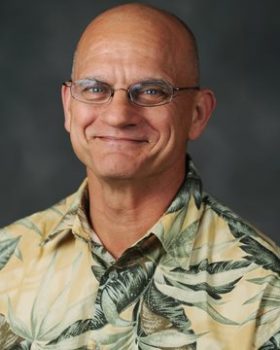 By Tom Arcaro, professor of sociology and director of Elon’s Project Pericles
By Tom Arcaro, professor of sociology and director of Elon’s Project Pericles
Our world needs people who are privileged to have a university degree and are committed to something larger than themselves. It needs people with a sense of social responsibility, an embrace of their obligations as global citizens and a will to learn more about their connections to others around the world.
That said, not all charity or service is good. Some is downright counterproductive or, dare I say, reckless. Here’s advice on avoiding what we call “toxic charity,” based largely on my experiences overseas but with universal lessons that affect local communities, too.
First, be sober about your motivations. Why did you apply to a program or volunteer for a project? If it was to “save some poor people” in, say, Africa, please stay home. With this motivation your experience is more about you than about others. If you desire to work with people because you deeply understand that your liberation is bound up in theirs and, ultimately, there is not an “us” and a “them” but rather just an “us,” then go forward. You already realize that you should never do “for” others but rather do “with” and, ultimately, “be with” those people. Partner, don’t patronize.
Then, be clear about your expectations. You will not, I am quite certain, save the world, or even one small town or village. Development work is complicated and devilishly difficult to assess over time. You can touch some lives, but without considerable research, especially into local cultures and people, the touching you do may do more harm than good. You may run into corruption, pettiness and human frailty. You will definitely run into organizational and bureaucratic challenges that may undermine your efforts. Set as your goal to have at least a net positive impact on the lives with which you intersect.
Next, be prepared for the impact that this experience will have on you. If you avoid living in a bubble and truly merge your world with the local community, your fundamental identity will change. If you serve overseas, your reentry shock coming back to American life will be dramatic, and for a time you will feel that you no longer belong. Needless to say, the longer you remain in the field, the more acute this phenomenon becomes. You will eventually recalibrate and strain past relationships to determine which new ones you forge.
Finally, be responsible. I know this sounds obvious, but if you commit to development work, do it to the best of your ability. Anything less than your best shows disrespect to your hosts, to your organization and, perhaps most importantly, to yourself. Work for dignity in your life and in the lives of others.
Translating faith into meaningful service
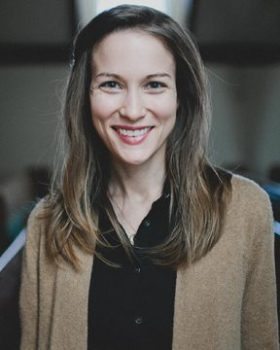 By the Rev. Erin M. Keys ’05, First Presbyterian Church of Greenwich, Conn.
By the Rev. Erin M. Keys ’05, First Presbyterian Church of Greenwich, Conn.
In Christianity we are taught our highest calling as individuals is to love God with all our heart, soul and mind, and to love our neighbors as ourselves. We embody this calling by giving of ourselves in different ways, striving to have every action, as much as possible, be a reflection of God’s love.
But Christianity is by no means the only religion that emphasizes service. At the core of almost every religious teaching is the belief that our well-being is connected to the well-being of our neighbor. Charity is one of the five pillars of Islam. Zakat is the Arabic word used for charity; it literally means purification. It is through Zakat that Muslims believe one’s heart is purified from greed and realigned with God and service to neighbor. In Judaism the Hebrew word Tzedakah has come to mean acts of charity and service, and is a foundational component of the Jewish faith. Tzedakah also means justice and fairness and extends to treating others as equals.
In my own work with faith communities, service has taken many forms, from generous donations to weeklong service trips. However, what I have found is that, by far, the most challenging act of service—and often the most impactful—is to be kind to those we encounter every day. It sounds overly simplistic and, in light of the never-ending need in our world, can seem like an “easy way out.” Consistently practicing kindness is anything but easy. It takes tremendous dedication of mind and heart, and a constant willingness to put the other before oneself. I have witnessed small acts of kindness going much further than we would ever expect. To someone in need, someone who is hurting, to be treated with dignity and love can renew their spirit in a way that little else can.
Moreover, treating others as we would like to be treated changes us. It makes us more compassionate, more loving, more forgiving. Because, again, at the core level, what we all need is to feel valued for who we are, regardless of the other factors like socio-economic status, race, age, etc., that can define us. To be able to recognize this particular need in others is something anyone can do. You do not need to be rich or have extra time to volunteer. Which is why the Golden Rule is at the center of every religious instruction. Because service is not just about what you do for your neighbor, but how well you love them.
Introducing children to a lifetime of service
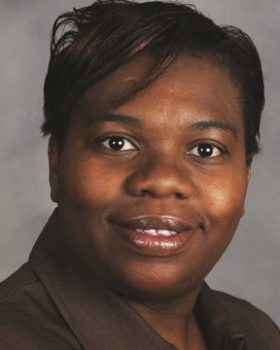 By Cherrel Miller Dyce, assistant professor of education
By Cherrel Miller Dyce, assistant professor of education
There are many things we learn within the ecosystem of our families and communities: morals, values, cultural traditions, the framework of faith, the value of work, how to treat others. Service is no different, and as the old adage goes, “charity begins at home.” Teaching children the authentic meaning of service requires us to model and communicate such meaning in our daily routines.
Never mind the self-help guides. I recommend the tools that my grandmother, a farmer from rural Jamaica, used for teaching me the meaning of service. Her concept utilized the five senses: sight, hearing, smell, taste and touch. Though the five senses might seem simple and mundane, developmental psychologists and early childhood educators have documented the ways in which children learn every day by using these points of entry. My grandmother, a valorous community advocate, likewise relied on senses to instill in me from a very young age my love of service. Here are examples of what I mean:
Sight: Children are keen at watching what you do and then imitating your actions. Let your children see you helping others, whether it’s a neighbor, someone in the grocery store or a stranger on the street. Take these moments to model for your children the importance of valuing humanity despite their current conditions.
Hearing: Children are always listening, so be mindful of your conversation, and purposefully include service talk whenever possible. When a conversation comes up about school or a TV commercial, or even when you are driving by a person who appears homeless, use these moments to instill the importance of helping others.
Smell: My grandmother was known for feeding those who were hungry. Take the time to cook your family’s favorite meal and share it with others. Whether it’s an elderly neighbor who will be the recipient or a faith-based ministry, allow children to experience the smell of service.
Taste and Touch: Let children see you breaking bread or sharing a meal with others in need. Give the child the opportunity to deliver a portion of this meal to someone who is less advantaged or less fortunate. It develops an appreciation and comfort in reaching out and providing assistance within the general community.
Teaching service begins at home. Once the foundation is set, everything else falls into place. The path is paved for children to embrace societal differences and reach even higher levels of excellence in their future schooling and careers.
Army Strong: Serving your country
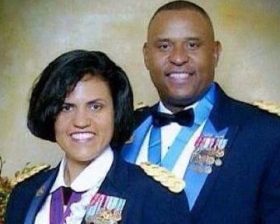 By Col. John Bradsher ’88, director of operations and training at Intelligence and Security Command (INSCOM)
By Col. John Bradsher ’88, director of operations and training at Intelligence and Security Command (INSCOM)
Why does one serve his or her country in the military? Everyone has the opportunity to serve: you can serve in your community, your local church and schools. But serving in the military is a very different kind
of service.
To understand why I serve, we must first look back on how and why I entered the Army. As an Elon student-athlete in the mid 1980s, I was part of a team, and the team was bigger than one person. As I researched my options for post-college employment, the Army moved to the top of my list because its values and culture aligned with my values. The Army is a team of teams, and people are its No. 1 asset. I joined the ROTC program and that began my experience of military service. My wife, Ret. Lt. Col. Tanya Bradsher, who now serves as assistant secretary for public affairs in the U.S. Department of Homeland Security, also had the experience of serving in the Army, first as a military dependent and later as an officer. Having grown up in a military family, she learned at an early age to appreciate the sacrifice and dedication military service requires.
There is no other job in which you are trusted with America’s sons and daughters to protect, train and, if called upon, fight the nation’s wars. We both serve for the soldiers and their families. Military service is all about something bigger than oneself—it is truly not about the “I” but all about the “we” in military service. You volunteer to support and defend the Constitution of the United States against all enemies, foreign and domestic. Only 1 percent of Americans wear the uniform. That alone makes military service a very different type of service.
As a dual military family, we had to balance two deployments to Iraq and many nights away from home with our marriage and children. There were many sacrifices over 20-plus years of military service, but they were all worth it. No matter how you serve, serve. There is no greater feeling than helping others on the battlefield or in your community.
Living as an engaged global citizen
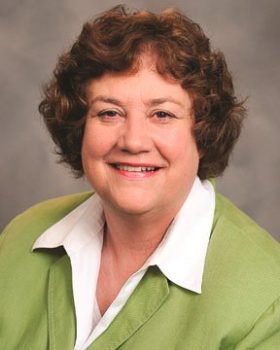 By Mary Morrison, director of Elon’s Kernodle Center for Service Learning and Community Engagement
By Mary Morrison, director of Elon’s Kernodle Center for Service Learning and Community Engagement
A hallmark of an Elon graduate is his or her commitment to community engagement. When we think of volunteer efforts, the first thing that comes to mind is often direct service—tutoring a child, building a house or serving meals. But nonprofit organizations, like for-profit businesses, also need accountants, graphic designers, lawyers, writers and technology experts.
Ultimately, graduates are challenged to ask themselves how an Elon education can best meet community needs. It took me a long time to accept that my niche in service was indirect service. I now realize that for every hour I could spend tutoring a child, I could use that hour recruiting 10 people to tutor 30 children. I understand that my talents lie in streamlining the system, identifying additional resources and thinking strategically about how to meet goals.
In short, my best contribution involves using my skills to address the missions of organizations. If you wonder whether you’re using your own skills the best possible way, start by identifying an issue in your community that you care about and find out what organizations are addressing that need. Contact the organization and meet with the volunteer coordinator. Set up a time to visit the organization to learn more about its work. Bring your résumé and a willingness to partner with the organization. The process of finding a fit between your skills and the organization’s needs is similar to any job interview. Start with a limited but consistent commitment until you get to know the organization better and the staff gets to know you. It won’t take long before you know if the organization is right for you.
Volunteering with a nonprofit is only one way to serve your community. City and county governments need residents to serve as well. It can be a fascinating experience to serve on the economic development commission, the water resource board or the human services advisory committee. You can also get involved in political organizations. If you think you might like to run for the school board or the city council one day, start attending their meetings. The local chamber of commerce, civic organizations and religious groups all offer opportunities for community engagement.
Being an engaged, global citizen means using the skills and abilities you developed at Elon to make a difference in the lives of others. To quote Frederick Buechner, “Vocation is where our greatest passion meets the world’s greatest need.”


